INNOVATION THROUGH COLLABORATION

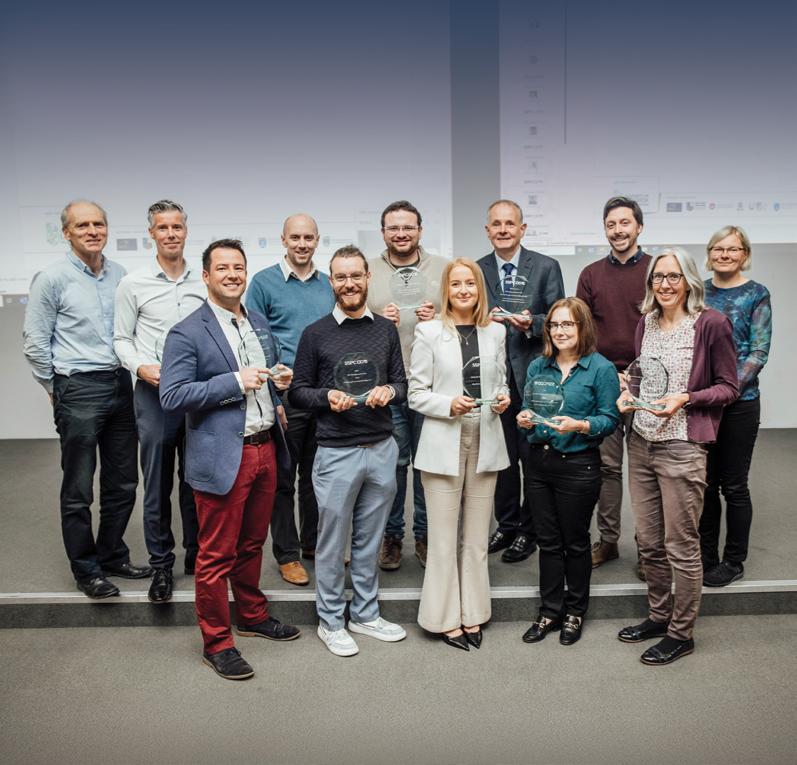



SSPC, hosted at University of Limerick, is a world leading, interdisciplinary hub for (bio)pharmaceutical research and innovation. Through our reputation for scientific excellence, close industry partnerships and talent pipeline we solve industry and societal challenges. Our unique ecosystem sets us apart placing Ireland as a trailblazer in (bio) pharma research and talent development.
SSPC is a national centre hosted at University of Limerick in collaboration with University College Cork, University of Galway, Trinity College Dublin, Royal College of Surgeons Ireland, Dublin City University, University College Dublin, Maynooth University and NIBRT - National Institute for Bioprocessing Research and Training.
Scientific Excellence Through our globally unique collaborations, we deliver impactful science that drives sustainable pharmaceutical production and improves global access to medicines.
Return on Investment
Industry Partnerships
Societal Impact
SSPC has leveraged an additional €165m investment from industry and other competitive sources, delivering significant economic and human capital impacts.
SSPC works with >50 industry partners including Pfizer, J&J Innovative Medicines, Sanofi, Eli Lilly, BMS, MSD. SSPC supports a strong indigenous community including APC Ltd., and Scale Up Systems.
SSPC’s Education & Public Engagement programme has a global reach of >5.6 m people. Informed by research & in partnership with public stakeholders, the programme supports perception, understanding and trust in (bio)pharma research.
Innovative Talent 300+ alumni for the (bio)pharma sector. Our talent pipeline is critical for growth, while future proofing the sector in Ireland.
Transition to industry 84% of our PhD graduates transition to industry. SSPC attracts, trains, and retains high calibre talent for Ireland.
An event hosted by the Royal Irish Academy, in collaboration with SSPC and BioPharmaChem Ireland, the Ibec group, saw representatives from industry, academia, and government agencies come together to discuss the future of innovation in the Irish (bio) pharma sector. Key stakeholders convened to address pivotal issues concerning Ireland’s enterprise in attracting investment, maintaining competitiveness, fostering innovation, and nurturing talent to ensure sustained growth in the sector. Notable speakers included Declan Hughes from the Department of Enterprise, Trade and Employment, Danny McCoy, CEO of Ibec, and Professor Pat Guiry, President of the Royal Irish Academy.
sspc.ie/disucussing-innovation-in-irish-biopharma

Professor Damien Thompson, SSPC Scientific Director, Declan Hughes, Secretary General, Department of Enterprise, Trade and Employment, Professor Pat Guiry, President, Royal Irish Academy, Director, Centre for Synthesis and Chemical Biology School of Chemistry, UCD and SSPC and Sinéad Keogh, Director, BioPharmaChem Ireland, and Head of Sectors, Ibec.
SSPC’s Scientific Director Professor Damien Thompson, a world leader in molecular modelling of sustainable materials, says:
As a flagship Research Ireland Centre, SSPC is shaping the future health and wellbeing of Ireland’s society, delivering on citizens’ priorities. The agility of our leadership and pool of researchers lets us take advantage of economic opportunities, and the innovation that we bring provides an essential building block for a competitive and prosperous economy to benefit Ireland and its people.
Through its pioneering research and robust industry partnerships, SSPC has been a catalyst for economic growth, driving innovation and fostering a dynamic pharmaceutical sector. SSPC has unprecedented links with the biggest names the pharma industry, collaborating with >50 partners. SSPC supports over 2,400 Irish jobs and employs over 394 highly skilled professionals.

SSPC researchers are continuing to work collaboratively both within the Centre and with our international network of collaborators to capitalise on new opportunities to provide the foundations for an innovationintensive economy, and to ensure that Ireland’s future resilience and capacity to handle crises is enhanced. Our research programme addresses data-driven medicine development and manufacture of future medicines including biologics.

“At SSPC, we are witnessing groundbreaking scientific advancements that are transforming the landscape of (bio)pharma research. The dedicated teams are pushing the boundaries of innovation, delivering exceptional outputs that promise to revolutionise patient care and treatment options. The future of the sector is being shaped here.”
Professor Jim Litster
SSPC Science Advisory Board Chair
Brian Glennon (Professor of Engineering in University College Dublin), discusses his contribution to the establishment of SSPC. Currently, the pharmaceutical and (bio)pharmaceutical industry in Ireland plays a vital role in the country’s economic landscape. The importance of state of the art research and the training highly qualified graduates is still as relevant now as it was when SSPC was began.
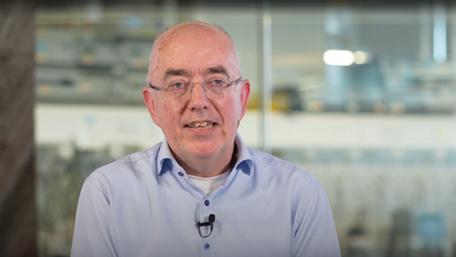
The importance of SSPC to the Irish pharmaceutical sector was recognised at the Irish Pharma Industry Awards 2024, winning in two categories, Research Centre of the Year and Partnership Alliance of the Year.
The pharmaceutical industry plays a pivotal role in Ireland’s economy, with a long-standing history of excellence and innovation. In recognition of this, the Irish Pharma Industry Awards serve as a platform to celebrate and honour the achievements and innovations within the Irish pharmaceutical sector.
Professor Damien Thompson, SSPC Scientific Director, in accepting the award said: “At the forefront of cuttingedge scientific breakthroughs and innovation in the biopharmaceutical industry, SSPC has proven itself as a leader in driving advancements that significantly impact this industry. The Centre’s dedication to pushing boundaries and exploring new frontiers have earned it well-deserved accolades at this prestigious event.”
UL Vice President Research Professor Norelee Kennedy said: “These awards are not only a recognition of SSPC’s achievements, but a testament to the unwavering commitment to improving lives through science. We are delighted that University of Limerick is part of such a significant research centre, shining a spotlight on the remarkable accomplishments and innovations that shape the future of healthcare and pharmaceuticals, not only in Ireland but around the world.”
Sinead Keogh, Head of Sectors and Director, BioPharmaChem at Ibec, added: “The availability of a highly skilled workforce has been pivotal in Ireland’s ability to leverage the opportunities presented by the global growth of the (bio)pharma sector. SSPC nurtures talent, driving innovation, whilst maintaining economic vitality. These awards are a testament to the exceptional work being done by SSPC and serve as a reminder of the industry’s importance and its dedication to improving the well-being of individuals worldwide.”
SSPC has a strong commitment to collaborate with world-leading institutes to foster a culture of knowledgesharing and accelerated progress in (bio)pharmaceutical research.
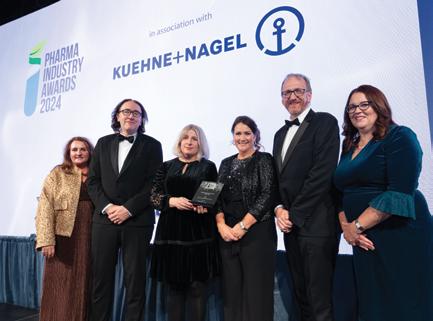
This year, SSPC won two awards at the Irish Pharma Industry Awards, in the categories Research Centre of the Year and the Partnership Alliance of the Year.
Pictured receiving the Pharma Research Centre of the Year award sponsored by Eurofins, from left to right, Louise O’Neill, SSPC Communications Manager, Professor Damien Thompson, SSPC Scientific Director, Aisling Arthur, SSPC Industry Engagement Manager, Associate Professor’s Finbarr O’Sullivan, and Paula Meleady, Dublin City University.
NIBRT to partner with SSPC, strengthening collaborative ties in the biopharma sector
SSPC announced that it is to expand its research capabilities with the addition of The National Institute for Bioprocessing Research and Training (NIBRT) as a partner. This collaboration builds on a strong track record of successful joint initiatives between SSPC and NIBRT, aiming to further advance the development of innovative technologies that address critical industry challenges.

On Friday, May 3, NIBRT & UCC, officially announced a strategic collaboration as part of the Future Pharmaceuticals initiative with the joint appointment of Professor Anne Moore, an SSPC investigator, as Principal Investigator at NIBRT & the School of Biochemistry & Cell Biology in UCC.
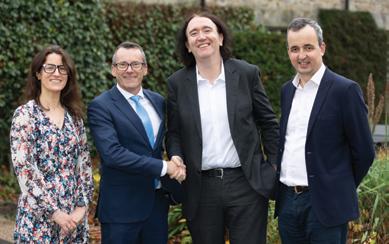
NIBRT joined SSPC, Strengthening Collaborative Ties to Drive Innovation in the (bio)pharma Sector. Pictured at the announcement were (left-right): Dr Sinéad O’Doherty, SSPC, Dr Darrin Morrissey, NIBRT CEO, Professor Damien Thompson, SSPC Scientific Director, and Killian O’Driscoll, NIBRT CCO.
Varda Space Industries, Inc., the world’s first in-space pharmaceutical processing and hypersonic Earth re-entry logistics company, together with SSPC researchers based at the University of Limerick and Mathematics Applications Consortium for Science and Industry (MACSI), Ireland, announced a research collaboration that aims to advance mathematical modelling of crystallization in microgravity, the first such framework that considers polymorphism.
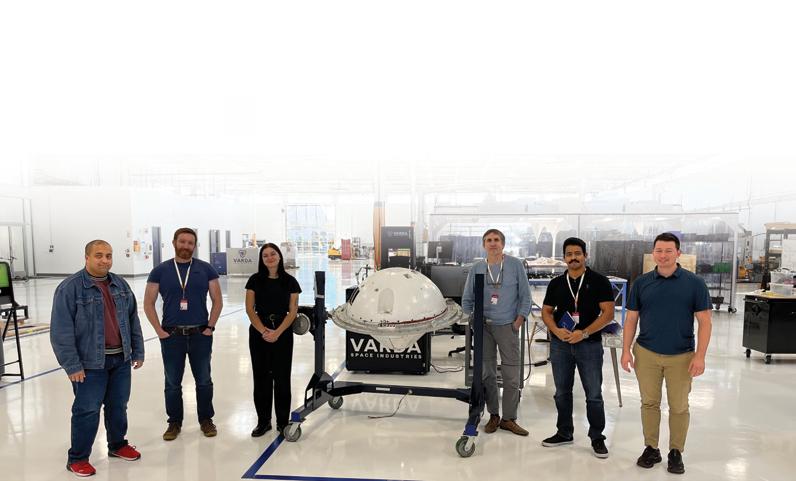
A molecule can exist in multiple crystal forms; each different crystal form is known as a polymorph. The crystal structure contributes various characteristics to the molecule, so polymorphs of the same molecule can have very different properties, such as their melting point, hardness, and solubility. Understanding and controlling polymorphism is essential for manufacturing pharmaceuticals, and this partnership between Varda and SSPC will serve to further analyze and predict the impact of gravity on crystallization.
SSPC and MACSI researchers from University of Limerick on a recent visit to Varda Space Industries, California, US, Kanjakha Pal, Senior Process Engineer, Varda Space Industries, Dr Kevin Moroney, University of Limerick, Haley Bauser, Senior Product Engineer, Varda Space Industries, Professor Michael Vynnycky, Dr Milton Assunção, University of Limerick and, Adrian Radocea, Chief Science Officer, Varda Space Industries.
19 SSPC investigators are recognised among the leading experts in their fields in the prestigious Elsevier/ Stanford University World’s Top 2% Scientists ranking. These rankings recognise researchers as being experts in their field. This achievement demonstrates how SSPC researchers are among the most citied and influential in their field globally.
Professor Mike Zaworotko University of Limerick, Organic Chemistry
Professor Vivek Ranade University of Limerick, Chemical Engineering
Professor Gavin Walker University of Limerick, Chemical Engineering
Professor Edmond Magner University of Limerick, Chemical Physics
Professor Harry Van den Akker University of Limerick, Chemical Engineering
Professor Kevin Kavanagh Maynooth University, Microbiology
Dr Andrea Erxleben University of Galway, Inorganic & Nuclear Chemistry
Professor Caitriona O’Driscoll University College Cork, Pharmacology & Pharmacy
Professor Stephen Connon Trinity College Dublin, Organic Chemistry
Associate Professor Tim Persoons Trinity College Dublin, Mechanical Engineering & Transports



Professor Thorfinnur Gunnlaugsson
Trinity College Dublin, Inorganic & Nuclear Chemistry
Professor Pat Guiry
University College Dublin, Organic Chemistry
Professor Declan Gilheany
University College Dublin, Organic Chemistry
Dr Marcus Baumann
University College Dublin, Medicinal & Biomolecular Chemistry
Professor Martin Clynes Dublin City University, Oncology & Carcinogenesis
Dr Soumya Mukherjee
University of Limerick, Organic Chemistry
Professor Anne Marie Healy
Trinity College Dublin, Pharmacology & Pharmacy
Dr Marco Monopoli
Royal College of Surgeons, Nanoscience & Nanotechnology
Professor Alan Dobson
University College Cork, Microbiology
Enantioselective Copper-Catalyzed Alkynylation of Quinolones Using Chiral P,N Ligands, published on the first day of the Six Nations rugby campaign depicting an image of a rugby ball, Dairine Morgan, Cian Reid, Pat Guiry, report a catalytic enantioselective alkynylation of quinolones. In this reaction, quinolones are silylated to form a quinolinium ion which then undergoes an enantioselective attack by a copper acetylide, templated by (S,S,Ra)-UCD-Phim, in The Journal of Organic Chemistry
Thiazole orange-carboplatin triplex-forming oligonucleotide (TFO) combination probes enhance targeted DNA crosslinking†. Joseph Hennessy, Piotr Klimkowski, Daniel Singleton, Alex Gibney, Malou Coche, Nicholas P. Farrell, Afaf H. El-Sagheer, Tom Brown and Andrew Kellett on the development of carboplatin-TFO hybrid combination probes which enhance targeted DNA crosslinking, in Medicinal Chemistry
DNA binding by intercalation, showing both sequence and enantiospecificity, of a ruthenium diimine complex, is reported by Christine Cardin, Andrew Kellett et al., in their research article, Probing a Major DNA Weakness: Resolving the Groove and Sequence Selectivity of the Diimine Complex Λ-[Ru(phen)2phi]2+. The right-handed helix seen in the crystal structure shows variable degrees of twisting, including the first intercalation by a ruthenium complex from the DNA major groove. In solution, the lambda enantiomer was found to be more stabilising with a range of DNA sequences, in Angewandte Chemie
• 55% of our current phase publications have an international co-author
• Co-Authors in 12 of the top 20 most prestigious Universities in the World
Oxford University UK
Massachusetts Institute of Technology US
University of Cambridge UK
Imperial College London UK
ETH Zurich Switzerland
National University of Singapore Singapore
University College London UK
Cornell University US
University of Melbourne Australia
Peking University China
The University of New South Wales Australia
The University of Sydney Australia
University of Toronto Canada
The University of Edinburgh UK
Columbia University US
Université PSL France
Tsinghua University China
This virtual special issue of Molecular Pharmaceutics is dedicated to pharmaceutics research on the island of Ireland. Ireland has a strong tradition of research excellence in pharmaceutics, with a focus on developing innovative solutions for drug delivery and formulation.
An editorial written by guest editors, including SSPC investigators, Professor Anne Marie Healy, and Professor Elizabeth Topp
In Ireland, the pharmaceutical industry is a key contributor to the economy, with several major multinational companies operating in the country - 8 of the 13 articles featured 15 SSPC investigators and PhD researchers, across 5 Irish Universities in Ireland:
Impact of Propeptide Cleavage on the Stability and Activity of a Streptococcal Immunomodulatory C5a Peptidase for Biopharmaceutical Development
Vinayakumar Gedi, Francisco Duarte, Pratikkumar Patel, Promita Bhattacharjee, Malgorzata Tecza, Kieran McGourty, and Sarah P. Hudson. Mol. Pharmaceutics 2023, 20, 8, 4041-4049.
In Situ Cocrystallization via Spray Drying with Polymer as a Strategy to Prevent Cocrystal Dissociation
ShiZhe Shao, Michael W. Stocker, Salvatore Zarrella, Timothy M. Korter, Abhishek Singh, and Anne Marie Healy. Mol. Pharmaceutics 2023, 20, 9, 4770-4785.
M2pep-Modified Cyclodextrin-siRNA Nanoparticles Modulate the Immunosuppressive Tumor
Microenvironment for Prostate Cancer Therapy
Yao Sun, Michael F. Cronin, Monique C. P. Mendonça, Jianfeng Guo, and Caitriona M. O’Driscoll. Mol. Pharmaceutics 2023, 20, 11, 5921-5936.
Mechanochemically Induced Solid-State Transformations of Levofloxacin
Lena Kadri, Maria Carta, Giulio Lampronti, Francesco Delogu, and Lidia Tajber. Mol. Pharmaceutics 2024, 21, 6, 2838-2853.
Rationalizing Counterion Selection for the Development of Lipophilic Salts: A Case Study with Venetoclax
Callum D. Ryan, Brendan T. Griffin, and Joseph P. O’Shea, Mol. Pharmaceutics 2024, 21, 6, 2981-2992.
Colyophilized Sugar–Polymer Dispersions for Enhanced Processing and Storage Stability
Claudia Giannachi, Evin Allen, Gráinne Egan, Sonja Vucen, and Abina Crean, Mol. Pharmaceutics 2024, 21, 6, 3017-3026.
Comparative Analysis of Chemical Descriptors by Machine Learning Reveals Atomistic Insights into Solute–Lipid Interactions
Justus Johann Lange, Andrea Anelli, Jochem Alsenz, Martin Kuentz, Patrick J. O’Dwyer, Wiebke Saal, Nicole Wyttenbach, and Brendan T. Griffin* Mol. Pharmaceutics 2024, 21, 7, 3343-3355.
In Vivo Ocular Pharmacokinetics and Toxicity of Siponimod in Albino Rabbits
Rasha A. Alshaikh, Rania A. Salah El Din, Rania Gamal Eldin Zaki, Christian Waeber, and Katie B. Ryan, Mol. Pharmaceutics 2024, 21, 7, 3310-3320.
SSPC strives to conduct scientifically excellent research with impact. The following research highlights illustrate SSPC’s fundamental state of the art scientific work with notable breakthroughs.
Protein therapeutics provide invaluable treatments for illnesses including rheumatoid arthritis and cancer. These therapies are administered as injections or infusions and manufactured as sterile solutions commonly in glass vials.
Due to their relative instability, proteins can unfold or form aggregates when stored or handled incorrectly resulting in a loss of activity. Therefore, monitoring protein stability is a critical aspect of therapeutic protein development, manufacture and distribution. In this study, by Professor Abina Crean, Dr Khaled Elkassas, Dr Sonja Vucen, UCC et al. published in Analytical Chemistry: In-Vial Detection of Protein Denaturation Using Intrinsic Fluorescence Anisotropy | Analytical Chemistry, a novel spectroscopic method was developed capable of monitoring protein stability within glass vials.

M2pep-Modified Cyclodextrin-siRNA Nanoparticles Modulate the Immunosuppressive Tumor
Prostate cancer is the leading cause of cancer deaths in men. Conventional treatments like surgery, radiation, and chemotherapy often face challenges such as poor prognosis and resistance, especially in metastatic cases. This highlights the need for advanced targeted therapies. Immunotherapy has recently gained attention for treating prostate cancer, an immunosuppressive cancer. Small interfering RNA (siRNA) shows promise by silencing genes linked to cancer initiation and spread, targeting only the diseased site while sparing healthy tissue. However, the main challenge remains the effective delivery of siRNA to clinical settings.
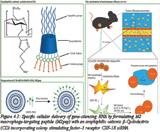
This work describes a novel non-viral nano-delivery system for siRNA designed to re-model the immune microenvironment of the prostate cancer tumour resulting in the reduction of tumour growth. Professor Caitriona O’Driscoll and team in UCC recently published this study in Molecular Pharmaceutic, Targeting lung macrophages for fungal and parasitic pulmonary infections with innovative amphotericin B dry powder inhalers: M2pep-Modified Cyclodextrin-siRNA Nanoparticles Modulate the Immunosuppressive Tumor Microenvironment for Prostate Cancer Therapy | Molecular Pharmaceutics
Targeting lung macrophages for fungal and parasitic pulmonary infections with innovative amphotericin B dry powder inhalers
Fungal pulmonary infections are among the most common invasive fungal infections and are known to present a growing and serious threat to human health. The lack of marketed antifungal therapies that are available for pulmonary administration motivates the development of antifungal and antiparasitic dry powder inhaler (DPI) formulations. For example, amphotericin B (AmB) is a highly efficient broad spectrum antifungal only marketed as an intravenous formulation. Responding to the lack of effective antifungal and antiparasitic pulmonary treatments, Professor Anne Marie Healy at TCD and co-workers developed a carbohydrate-based AmB dry powder inhaler (DPI) formulation, prepared by spray drying, as recently reported in the International Journal of Pharmaceutics: Targeting lung macrophages for fungal and parasitic pulmonary infections with innovative amphotericin B dry powder inhalers - ScienceDirect

SSPC has consistently delivered high quality publications, setting a strong foundation for translational science, leading to impact. See a sample of our outputs below:
Highly Selective p-Xylene Separation from Mixtures of C8 Aromatics by a Nonporous Molecular Apohost.
Rahmani, M., Matos, C., R., M., O., Wang, S., Bezrukov, A. A., Eaby, A. C. Sensharma, D., Hjiej Andaloussi, Y. Vandichel, M., Zaworotko, M.J., Highly Selective p-Xylene Separation from Mixtures of C8 Aromatics by a Nonporous Molecular Apohost, J. Am. Chem. Soc, 2023, 145, 50, 27316 – 27324.
Potent antimicrobial effect induced by disruption of chloride homeostasis.
Brennan, L.E., Kumawat, L.K., Piatek, M.E., Kinross, A.J., McNaughton, D.A., Marchetti, L., Geraghty, C., Wynne, C., Tong, H., Kavanagh, O.N., O’Sullivan, F., Hawes, C.S., Gale, P.A., Kavanagh, K., Elmes, R.B.P., Chem, 2023, Vol 9 Issue 11, 3138-3158.
MUC1 Glycopeptide Vaccine Modified with a GalNAc Glycocluster Targets the Macrophage Galactose C-type Lectin on Dendritic Cells to Elicit an Improved Humoral Response.
Gabba, A., Attariya, R., Behren, S., Pett, C., van der Horst, J.C., Yurugi, H, Yu, J., Urschbach, M., Sabin, J., Birrane, G., Schmitt, E., van Vliet, S.J., Besenius, P., Westerlind, U., Murphy, P.V., MUC1, J AM Chem Soc, 2023, 145(24), 13027-13037.
A Click Chemistry-Based Artificial Metallo-Nuclease.
G ibney, A., de Paiva, R.E.F., Singh, V., Fox, R., Thompson, D., Hennessy, J., Slator, C., McKenzie, C.J., Johansson, P., McKee, V., Westerlund, F., Kellett, A., Angew Chem Int Ed Engl., 2023, 18:62(38):e202305759.
Mesoscale Clusters in the Crystallisation of Organic Molecules.
Barua, H., Svärd, M., Rasmuson, Å.C., Hudson, S.P., Cookman, J., Mesoscale Clusters in the Crystallisation of Organic Molecules, Ang Chem Int Ed Eng, 2024, 4;63(10):e202312100.
CHOGlycoNET: Comprehensive glycosylation reaction network for CHO cells. Kotidis, P., Donini, R., Arnsdorf, J., Hansen, A.H., Voldborg, B.G.R., Chiang, A.W.T., Haslam, S.M., Betenbaugh, M., Jimenez del Val, I., Lewis, N.E., Krambeck, F., Kontoravdi, C, Metab Eng, Mar:76:87-96.
Coupled immobilized bi-enzymatic flow reactor employing cofactor regeneration of NAD+ using a thermophilic aldehyde dehydrogenase and lactate dehydrogenase Shor tall, K., Arshi, S., Bendl, S., Xiao, X., Belochapkine, S., Demurtas, D., Soulimane, T., Magner, E., Green Chem., 2023, 25,4553-4564.
Synthesis of Highly Reactive Ketenimines via Photochemical Rearrangement of Isoxazoles. Bracken, C., Baumann, M., Org. Lett., 2023, 25,35,6593-6597.
A phosphine free, inorganic base free, one-pot tandem Mizoroki-Heck olefination/direct arylation/ hydrogenation sequence, to give multicyclic alkylated heteroarenes. Kehoe, R.A., Light, M.E., Jones, D.J., McGlacken, G.P, Green Chem., 2023, 25, 5654-5660.
Applications of bio-resource based sustainable heterogeneous Pd-Nanocatalyst for CrossCoupling and Michael addition reactions.
Islam, M. D., Sarkar, S.M., Rahman, M.L., Hasan, K., O’ Reilly, E.J., Applications of bio-resource based sustainable heterogeneous Pd-Nanocatalyst for Cross-Coupling and Michael addition reactions, Chemical Engineering Journal, Vol. 483, 149271.
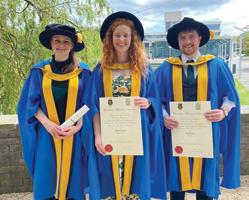
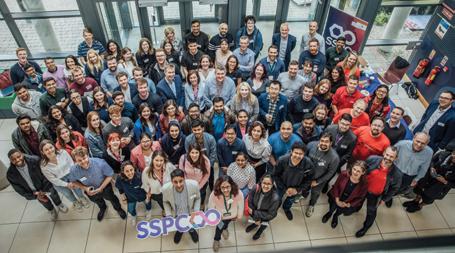








By placing people at the heart of everything we do, we foster a culture of inclusivity and innovation, where every voice is heard and valued.
This commitment to our people not only propels our scientific achievements but also ensures a supportive and enriching workplace for all. It is our vibrant community that fuels our individual and collective success as a Centre.
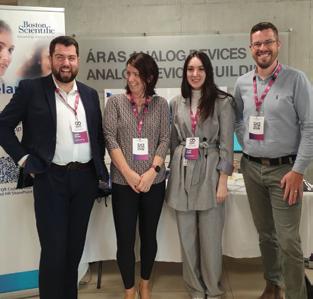
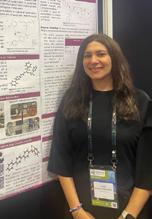


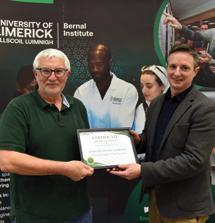










SSPC has made a significant impact through its ground-breaking advancements and scientific outputs. With a relentless commitment to innovation, the Centre has revolutionized the pharmaceutical industry.
Maynooth University leads study on EB skin condition treatment
Led by Associate Professor Rob Elmes and work being carried out by Dr Hilal Kirpik at Maynooth University, new research is being done on treating those living with the genetic skin condition epidermolysis bullosa (EB) with new bandages. Over the course of two years, the team will examine whether ‘spray on, wash off’ bandages will be a viable alternative to bandages currently used by those living with EB, otherwise informally known as ‘butterfly skin’.
www.sspc.ie/maynooth-university-leads-study-on-spray-onwash-off-bandages-for-painful-eb-condition

A team of SSPC scientists based in Dublin City University (DCU) have created a new compound that can potentially destroy the DNA of cancer cells using a method known as “click” chemistry.
Professor Andrew Kellett of (DCU), said that click chemistry, the method used for the international study, makes it ‘much more efficient to find new drugs’. The study was a collaboration between DCU, SSPC, the University of Southern Denmark and Chalmers University of Technology in Sweden.

www.siliconrepublic.com/innovation/dcu-cancer-dna-tc-thio-compound-andrew-kellett-click-chemistry
Published in the prestigious German journal Angewandte Chemie recently, the international study featured on the journal’s cover page and was described as a “hot paper”.
https://onlinelibrary.wiley.com/doi/10.1002/anie.202305759
Nanocomp led by Professor Sarah Hudson, UL, is a patented oral drug formulation platform that utilises novel drug nanoparticle technology to change poorly water-soluble APIs into powder ready form for tableting with superior bioavailability and stability to current more complex formulation technologies. Nanocomp’s platform can be scaled with potential manufacturing and environmental efficiencies. Commercialisation of this technology provides the industry with a novel methodology to overcome the bioavailability and instability trends which allow delivery of therapies to the patient. The technology also has broad application in decreasing cost of goods in currently supplied medicines, with both points evidencing potential for health impacts.

This work, which enables “time travel” within cells, may revolutionise bio-sensing and imaging approaches. The dyes promise to have multiple medical applications, as well as uses beyond chemistry and biology.
SSPC scientists from Trinity College Dublin, in collaboration with the Royal College of Surgeons in Ireland, have developed special fluorescent, colour-changing dyes that, for the first time, can be used to simultaneously visualise multiple distinct biological environments using only one singular dye.
The work, published in leading international journal, Chem. First author, Dr Adam Henwood, Senior Research Fellow in the School of Chemistry and based at the Trinity Biomedical Sciences Institute (TBSI), worked on this design with PhD student Connie Sigurvinsson Professor Thorfinnur Gunnlaugsson, Professor of Chemistry in the School of Chemistry at Trinity and based in TBSI, is the senior author of the article. Professor Donal O’Shea, oversaw the investigation, is an expert in cell imaging based in RCSI’s Department of Chemistry and Super-Resolution Imaging Consortium.
www.sspc.ie/scientists-develop-colour-changing-dyes-that-light-up-cellular-activity/
Artificial Intelligence can be used to make drug production more efficient, economical, and sustainable, according to the international research team behind a ground-breaking new collaboration.
Scientists from University College Cork (UCC), with academic and industry leaders from Ireland and the United States are part of a new initiative named ‘InTeleCat’, which aims to accelerate the development of pharmaceuticals. The team, led by Dr Gerard McGlacken of UCC’s School of Chemistry, is comprised of experts in the fields of catalysis, computational chemistry, and data science.
www.sspc.ie/ai-can-make-pharma-production-cheaper-and-more-efficient
Led by Associate Professor Emmet O’Reilly, UL, Chromwatch is a proprietary Process Analytical Technology (PAT) capable of providing “contactless” scientific measurements. It has been specifically designed for sterile environments such as biotherapeutic manufacturing. The developed technology consists of a hardware and software combination that, when implemented as a tool for buffer management can reduce manufacturing times, increase batch throughput and optimise asset utilisation. The process is performed in a contactless format maintaining system sterility, a critical attribute for sterile environment.




€68.5M
Total funding secured €13.7M Total funding secured in 2024
uCAIR: Professor Christophe Silien (1) UL, HEu Cl4 – Digital, Industry & Space, €802k
Will develop a new imaging platform utilising non-linear optical fibres, Raman tech, and AI to improve our understanding of cellular biochemistry and create new opportunities for the development of targeted medical interventions.
CaviPRO: Professor Vivek Ranade (2), UL, MSCA-Doctoral Network, €573k
Will push the scientific boundaries and explore new directions for controlling hydrodynamic cavitation and its use in additive manufacturing and advanced process control.
MLTI-PHASE: Professor Michael Vynnycky (3), UL, MSCA-Postdoctoral Fellowship, €216k
Will develop new machine-learning based models for multiphase flow reactors.
EvaMobs: Professor Elizabeth Topp (4), NIBRT, HEU Health Cluster, €407k
Will develop a novel platform for development of antivirals that are evolvable and highly adaptable using monobodies aiding European pandemic preparedness.
PROSPLIGN: Professor Declan Gilheany (5), Dr Jessica Whelan (6), UCD, HEu Cluster 6 Food, Bioeconomy, Agriculture and Natural Resources, €328k
Will use a novel and innovative bio-prospecting methodology to identify naturally occurring bioactive molecules of interest for pharmaceuticals, cosmetics and fragrances as more sustainable replacements for existing ingredients.
MeChaNiSM: Professor Andrew Kellett (7), DCU, MSCA Doctoral Network, €573k
Will utilise single molecule techniques to revolutionise understanding of nucleic acids and their interactions with therapeutic oligonucleotides, small molecules and proteins.
CATALOOP: Professor Patrick Guiry (8), UCD, MSCA Doctoral Network, €286k
Will develop models and new experimental approaches, using data-driven methods, to close the loop on stereoselective catalysis and improve both yield and purity.








Disruptive Technologies Innovation Fund (DTIF)
Selio System – w/Selio Medical, Invermed Teoranta, St James’ Hospital Clinical Research Facility
Development of a novel needle tract sealant system for haemorrhage prevention during kidney and liver biopsy
Professor Sarah Hudson (9), Associate Professor Emmett O’Reilly (10) and Associate Professor Kieran McGourty (11), UL, €4.2M



InTeleCat: Dr Ger McGlacken UCC (13), Naughton Fellowship, US, $120k Ger McGlacken, partners with colleagues at University of California, Los Angeles (UCLA), Notre Dame University and Eli Lilly on this highly novel project will utilise machine-learning and AI to optimise and predict catalytic processes, ultimately reducing the time and cost to identify the best route for production of active pharmaceutical ingredients .

Towards Tumour Theranostics: Associate Professor Rob Elmes (14) MU, French National Centre for Scientific Research (CRNS) €111k
Rob Elmes partners with Dr Celia Bonnet, C.n.r.s - Center National De La Recherche Scientifique, Orléans, France, on a study exploring hypoxia activation as a tool for therapy and diagnostics
CHIRALIFE: Professor Damien Thompson (15), Dr Shayon Bhattacharya (16), UL, INSERM, France €60k
These funds were awarded by INSERM to establish a collaborative project to improve understanding of the impact of heterochirality on various molecular and cellular mechanisms.



Large-scale Award
Investigating the Biological Roles of Polyamines in CHO and other cells €1.28m
This project provides new knowledge on important processes involved in the production of protein therapeutics within cells and will lead to improvements in manufacturing of future therapeutics.
Professor Martin Clynes (17), Associate Professor Finbarr O’Sullivan (18), DCU
High risk, high reward projects
Site-specific chemical modifications of human Interferon-gamma for improved therapeutics
Dr Marina Rubini (19), UCD, €632k
BendZymes – Novel Catalysts for Glyco Applications.
Associate Professor Eoghan McGarrigle (20), UCD, €746k
Photochemical covalent protein profiling: a novel approach to enhance targeted drug discovery
Associate Professor Joanna McGouran (21), TCD, €648k
Alkali Metal based Ternary Chalcogenides (ABZ) Nanocrystals (NCs) Design from Materials to Applications: Towards a Retrosynthetic Nanocrystal Synthesis Pathway.
Associate Professor Shalini Singh (22), UL, €820k






Today, SSPC collaborations incorporate end-to-end research capabilities in both small molecule and biologics drug substance and drug product development & manufacture, with 50+ industrial partners engaging from around the globe, with excellence science, talent development and access to world class research expertise & infrastructure still being the fundamental activities within the Centre
€14.6M in industry investment achieved
52 Industry partners
53 Industry placements since 2019
2 Knowledge Days
105 industry co-authored publications
59 Industry project collaborations
2 Industry Recruitment Days
6 Community of Practice meetings




















CONFIDENTIAL PARTNER x 2

The SSPC Industry Placement Programme exposes researchers to the realities of the (bio)pharma sector , while simultaneously providing industry with an insight into current research innovations. During 2024 nine researcher placements were facilitated by SSPC in six companies including:
Aaron O’Sullivan, Johnson & Johnson
Niamh Leane, Pfizer
Parth Naik, Pfizer
Vidit Tiwari, Pfizer
Aoife Cotter, MSD Brinny
Claudia Giannachi, MSD Brinny
MD Kamruzzaman, SK Biotek
Mateo Flores Naranjo, Boston Scientific
Mohamad Bassiri, APC
SSPC has an excellent track record of publishing in partnership with industry, in 2024 a total of 18 joint industry publications have arisen from our member and non-member project collaborations, taking the cumulative total since 2019 to 105.
Published in Organic Process Research & Development, stemming from an Eli Lilly and University College Dublin catalyst improvement project with Professor Pat Guiry
Optimized Synthesis of an Abemaciclib Intermediate: Improved Conditions for a Miyaura Borylation/Suzuki Coupling Process


The first publication is now live In Process Biochemistry for SSPC’s project with Pfizer, Eli Lilly, Johnson & Johnson, BMS and MSD, Investigating the multiproduct use of a resin in downstream biopharmaceutical production. The findings suggest that the acceptance of chromatographic resin reuse for multiple products will be dependent on the development of analytical/bioinformatics tools such as those proposed in this work.
Carryover analysis by liquid chromatography mass spectrometry in a multiproduct resin reuse context.

The Selio System is a pre-biopsy intervention device which prevents haemorrhage occurring before kidney or liver biopsy takes place, thereby facilitating same day release of patients. Selio received funding under the DTIF for this potentially life-changing disruptive technology project, led by Professor Sarah Hudson, Associate Professor Emmet O’Reilly, Dr Kieran McGourty at University of Limerick.
Selio is a dedicated medical device company specializing in development of novel, disruptive medical devices to reduce complications associated with percutaneous needle access procedures. Selio’s vision is to become a global leader in the standard of care for biopsy patients using a novel, simple, safe and effective Selio Sealant System.


SSPC and Maynooth University recently announced a research partnership with Icelandic biotechnology start-up, Axelyf. This collaboration aims to impact patients’ lives through the development of nextgeneration delivery technologies for emerging therapeutics, such as the mRNA class of compounds
Örn Almarsson (CEO & co-founder, Axelyf), Associate Professor Rob Elmes, Maynooth University and Jamie Guidera, interim COO, SSPC.
https://sspc.ie/sspc-axelyf-biotech-collaborationlaunched-to-find-drug-delivery-breakthroughs/
At SSPC, our team is dedicated to informing and influencing policy and practice, with many researchers in leadership roles within national organisations, including Health Products Regulatory Authority boards; Royal Irish Academy (RIA) Diversity, Equality, and Inclusion committees; and notably Professor Pat Guiry in his new roles as President of RIA, ICI and EuChemS Division of Organic Chemistry. Through our research programs and initiatives, we strive to make complex scientific concepts accessible to all. Our internationally ranked Education and Public Engagement (EPE) team addresses many critical challenges including enhancing awareness and participation of under-represented groups in STEM.
€1.2m
in competitive funding won for EPE research
Direct engagement
254,585+ people reached EPE Activities 2,121+
The first of its kind within any Irish research centre, the SSPC EPE lab is a dedicated facility in enabling SSPC to provide an effective and impactful EPE offerings to the Irish public. The programme associated with the lab includes activities that relate to the science underpinning SSPC research. Fundamentally, the lab is utilised to advance the science capital of visitors and participants. Science capital looks at the individual and encapsulates their scientific knowledge, attitudes and experiences.
With this, we also apply an intersectional lens and work with visitors from socioeconomically deprived backgrounds. Combined, we ensure that through our pedagogically designed activities that visitors have a positive experience with STEM, a science lab and the university. At the launch, at Bernal Institute, University of Limerick, SSPC convened a panel discussion on dedicated spaces for public engagement and delivered the Medicine Maker Workshop to attendees.

To coincide with the lab launch SSPC released an EPE brochure, profiling the work conducted in the space over the past 10 years. It outlines our timeline and evolution to becoming a research informed programme with wideranging impacts. The brochure helps disseminate our work but will also be used to foster new partnerships. sspc.ie/sspcs-educationpublic-engagementbrochure/

Working with Community Engagement Facilitator Niamh Anne O’Sullivan, SSPC plays an integral part of the K4C schools’ project.

Working with two DEIS (Delivering Equality of Opportunity in Schools) primary schools in Limerick, the goal of K4C is to empower pupils to design and create their own research projects. SSPC facilitates the creation of the projects which have to be achievable by small groups in a school setting. SSPC continually works with the schools over the course of the 10-week project which culminates with a poster session in UL where the students display their work to a panel of judges.
The 2024 SSPC Symposium marked the launch of the citizen science Crystal Clear project whereby members of the public were asked to grow piezoelectric crystals at home and send them back to SSPC for testing. After an open advertisement, within two days, all 100 kits were requested through our online portal. All kits have been distributed and crystal growers from all over Ireland are now returning their crystals for analysis in the Actuate Lab run by principal investigator and European Research Counci lRC awardee Dr Sarah Guerin and team.

As part of Science Week 2024, a pilot SSPC Science Cafe was held in the Aughrim Court Community Centre in collaboration with An Siol (A community development project). Professor Kevin Kavanagh and Associate Professor Rob Elmes, MU, presented on the topic of antimicrobial resistance to a small group of retirees. Attendees also had the opportunity to look at cells through a light microscope.





A Rising Tide Lifts All Boats? The Model of Differentiation As a Tool for Diversity in Science toward Social Inclusion. Kieferle, S., Devetak, I., Essex, J., Hayes, S., Stojanovska, M., Mamlok-Naaman, R. and Markic, S., 2024. Journal of Chemical Education, 101(3), pp.789-797.
Top tips for designing and managing a public engagement laboratory McHugh, M., Eren, E., Guralp, G., Hari, K., Guerin, S., Hayes, S., O’Hehir, C., O’Sullivan, E., Zauers, A. and Tyndall, C., 2024. Journal of Chemical Education, 101(3), pp.1071-1077.
Investigating Language and Culture Awareness of Pre-Service Science Teachers in Ireland Eren, E. and Martin, C., 2024. Education Sciences, 14(7), p.69.
Challenges prescribing and dispensing oral antibiotics with poor palatability for paediatric patients: A qualitative interview study with GPs and pharmacists Elgammal, A., Ryan, J., Bradley, C., Crean, A. and Bermingham, M., 2024. Exploratory Research in Clinical and Social Pharmacy, p.100546.
A sustained sector-wide collaborative investment of time, resources, and expertise is essential to ensuring a highly skilled, industry-relevant talent pipeline. SSPC has contributed in abundance including, >300 industry-relevant early career researchers in the last 15 years. This talent pipeline is critical for growth, while future proofing the sector in Ireland.
SSPC PhD transition to Industry 84%
SSPC Postdoctoral researchers transition to industry 52%
SSPC has attracted and trained researchers from 42 different countries, with 53% of alumni representing a foreign nationality. 67% of our alumni remained in Ireland after their time with SSPC, meeting Ireland’s critical skills gap.

Mark Barrett CEO & Co-Founder APC & VLE therapeutics www.approcess.com
Mark Barrett, discusses APC & VLE therapeutics foundations, their innovative approach, leveraging advanced technologies and a collaborative environment to achieve rapid and efficient process development. Hear how the calibre of talent produced by SSPC, have tremendous interdisciplinary skills and a real fundamental knowledge of the sector, which is a key attribute and success of SSPC serving this industry really well.
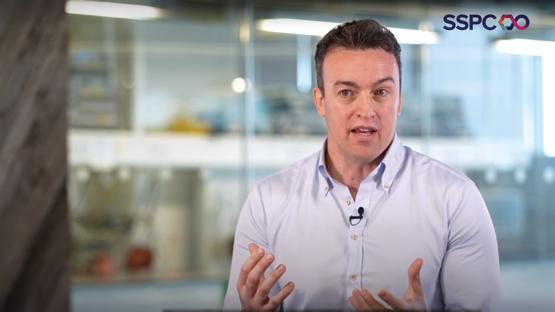

Continuous flow processing has been amongst the most significant step changes in API synthesis at scale for the past decade. In Ireland, the ecosystem spans internationally leading research teams at our partner universities, providing the next generation of early career researchers to drive this activity through to leading multinational pharmaceutical manufacture at scale, as well as Contract Development and Manufacturing Organisations.
SSPC plays a key role in ensuring the efficiency of the exchange of ideas, expertise and people at the industryacademic interface to ensure the Irish pharma sector continues to grow and develop as a leader in continuous flow technology in the GMP manufacture of APIs. https://sspc.ie/wp-content/uploads/2024/07/SSPC-flow-digital-spotlight.pdf
Bioconjugation and molecular hybrids are at the forefront of pharmaceutical innovation, offering transformative solutions for targeted drug delivery and enhanced therapeutic efficacy. These technologies enable the precise attachment of drugs to biological molecules and other molecular cargo, improving stability, solubility, and specificity. SSPC has a critical mass of renowned researchers in this area and the Centre plays a pivotal role in this field, leveraging its advanced research capabilities and talented researcher pool to develop cuttingedge innovation. SSPC’s expertise provides bespoke solutions that address complex industry challenges, driving innovation in drug substance research and manufacturing processes for the pharmaceutical and (bio)pharmaceutical sectors.
Part 1: https://sspc.ie/wp-content/uploads/2024/10/SSPC-Hybrid-Molecules-Bioconjugation-Part-1.pdf
Part 2: https://sspc.ie/wp-content/uploads/2024/10/Hybrid-Molecules-Bioconjugation-Part-2.png
Innovative process engineering makes manufacturing cost-effective, sustainable and responsive. SSPC teams work to develop fundamental scientific understanding underpinning process engineering applications to enable advances beyond the current state of the art. Our key research focus is on process intensification and continuous manufacturing including the development of modular manufacturing platforms. The advances in these areas are facilitated by multi-scale modelling of multiphase flows, materials and processes. This first part of our spotlight on process engineering shares some exciting recent breakthroughs. https://sspc.ie/wp-content/uploads/2024/08/Process-Eng.-Spotlight.pdf
SSPC shines a spotlight on its’ research initiatives in material, dosage form and process design which work together to convert drug substances into stable, effective, and manufacturable drug products. Innovations in this space enables the clinical, regulatory, and commercial phases of drug development. Advancements in understanding disease pathologies and identifying targets to restore health have led to the design of complex therapeutics, with challenging properties, increasing the importance of formulation, drug delivery vehicles and drug product design. Here we highlight just a few examples of research projects and the talented SSPC researchers leading the work from across Ireland to showcase these initiatives. The selected projects focus on designing novel routes of administration for therapeutic molecules, ranging from biologics to hybrid and small molecules, developing medicines with increased therapeutic effectiveness and more patient friendly dosing regimens, ensuring better health outcomes and improved quality of life for patients.
https://sspc.ie/wp-content/uploads/2025/01/Drug-Delivery-Spotlight-Part-1.pdf
New industry partner 1
Publications 158
Industry publications 23
Active collaborative industry projects 18
Industry placements 9
National/International Funding €13.7M
National Centre Accolades 2
Industry partners 52
Publications 871
Industry publications 105
Collaborative industry projects 57
Industry placements 53
International funding €68.5M
Centre National Accolades 15
Dr Sarah Hayes Chief Operations Officer
Jamie Guidera Interim Chief Operations Officer
Sarah.Hayes@ul.ie
Jamie.Guidera@ul.ie
Dr Orla Power Grant Head of Strategic Development Orla.Power@ul.ie
Aisling Arthur Industry Engagement Manager Aisling.Arthur@ul.ie
Dr Kristy Butler Research Programme Manager, Targeted Projects Kristy.Butler@ul.ie
Hilda Fogarty Research Programme Manager Hilda.Fogarty@ul.ie
Louise Laffan Reporting, Compliance & Accounts Officer Louise.Laffan@ul.ie
Colm O’Hehir Education Training & Public Engagement Manager Colm.OHehir@ul.ie
Dr Martin McHugh Project and Public Engagement Officer Martin.McHugh@ul.ie
Louise O’Neill Communications Manager Louise.ONeill@ul.ie